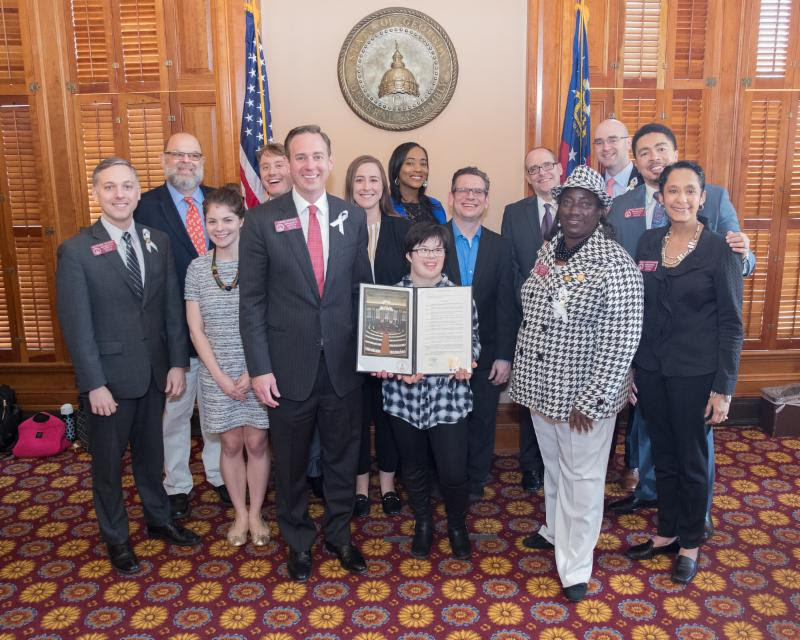Public Policy for the People: April 1

Volume 5, Issue 7 • 2019 Legislative Session • April 1, 2019
 Members of the Children's Freedom Initiative gathered last Friday with Representative David Dreyer and his colleagues Representatives Matthew Wilson, Sandra Scott, J. Craig Gordon, and Shelly Hutchinson to recognize the coalition's work to stop the institutionalization of children in Georgia.
Members of the Children's Freedom Initiative gathered last Friday with Representative David Dreyer and his colleagues Representatives Matthew Wilson, Sandra Scott, J. Craig Gordon, and Shelly Hutchinson to recognize the coalition's work to stop the institutionalization of children in Georgia.
Who are my state legislators?
Be in the Know: Rumblings Under the Gold Dome
Only one more legislative day to go! Indeed, the gavel will fall for the last time tomorrow evening, marking the end of the 2019 legislative session. Of note, this will be our last Public Policy for the People Legislative Newsletter. Our next edition will appear in the Spring edition of Making A Difference Magazine. You can expect a copy to arrive in our inbox mid-April, or find a copy at www.gcdd.org.
With that in mind, we will waste no more time and dive right in to our legislative updates.
Healthcare: The Governor signed SB 106 into law on March 27, officially empowering the Governor and the Department of Community Health to draft and submit a plan for Georgia's partial Medicaid expansion. Specifically, Governor Kemp may submit a 1332 Waiver to customize the private health insurance market and a 1115 Waiver to expand Medicaid for those living up to 100% of the federal poverty level. It is important to remember that this bill only grants Governor Kemp the authority to submit a waiver. There is still much work to be done. It is our hope that Governor Kemp will keep the needs of Georgian's with disabilities in mind as he crafts his waivers.
Budget: The House and Senate worked out their differences in Conference Committee on April 28. While you can find the full version of the FY 2020 budget online, we did want to highlight a few areas for you.
- Department of Behavioral Health and Developmental Disabilities
- $3.7 million to annualize 125 NOW and COMP waivers added in FY 19
- $4.2 million to fund 125 new NOW and COMP waivers
- $120,417 to fund a provider rate increase of 10% for Supported Employment for individuals with developmental disabilities
- $50,000 in one time funding for permanent supported housing for individuals with developmental disabilities in Forsyth County and create a model plan for statewide utilization
- Utilize $100,000 in existing funds to provide the final installment of the three-year plan for Georgia Options
- $7 million to offset a reduction in Medicaid patient revenues to maintain ongoing state hospital system operations
- Department of Community Health
- $737,639 to fund four additional positions, training, and associated operations for increased background checks for owners and employees of long-term care facilities pursuant to SB406(2018 Session)
- $513,000 to serve medically fragile children through the Champions for Children program
- $401,524 in funds for the second installment of a two-year plan to increase the personal needs allowance for nursing home residents by $5 to meet the $20 per month requirement pursuant to the passage of HB2016(2017 Session)
- $330,000 in funds for nursing homes to support enhanced background checks
- Department of Human Services
- $143,991 in funds for the second installment of a two-year plan to increase the personal needs allowance for nursing home residents by $5 to meet the $20 per month requirement pursuant to the passage of HB206 (2017 Session)
- $1.3 million to fund 17 new adult protective services caseworkers
- $366,752 to fund 5 new public guardianship caseworkers
- $338,802 to sustain options counseling, program outreach, and quality assurance for the Aging and Disability Resource Connection (ADRC)
- $157,000 for assistive technology to assist older Georgians, to be dispersed to the 9 Centers for Independent Living and 12 Area Agencies on Aging at approximately $7,500 per location
- $849,951 to fund 50 new Medicaid Aged, Blind, and Disabled eligibility caseworkers
- Georgia Vocational Rehabilitation Agency
- $149,733 to expand outreach of independent living for individuals with disabilities in undeserved areas
- $105,500 Increase funds to provide a state match to deploy Academic Transition Teachers in Inclusive Post-Secondary Education (IPSE) programs and, in collaboration with the Center for Leadership in Disability and the Georgia Council on Developmental Disabilities, develop job descriptions and memorandums of understanding that are in compliance with Federal statutes, regulations, and the terms and conditions of the federal grant fund to be implemented on July 1, 2019
Low THC: The Senate Regulated Industries and Utilities Committee made significant changes to HB 324. Scheduled for a vote in the Senate last Friday, the bill passed with a vote of 44 to 8. Among the many changes the Senate made include provisions to create the Georgia Access to Medical Cannabis Commission with the authority to import Low THC Oil from other states, as well directing the University of Georgia and Fort Valley State University to research and cultivate Low THC Oil. Additionally, the Senate version of HB 324 allows for two private companies to cultivate in state. As the Senate changed the bill, a Conference Committee has been appointed to work out their differences.
Parental Rights: Spearheaded the National Federation of the Blind, Georgia Affiliate, HB 79 seeks to diminish the discrimination parents who are blind face when raising children. While the bill has now passed the House and the Senate, a few tweaks in the Senate Judiciary Committee mean HB 79 must return to the House for a final vote.
Don't forget, the House and Senate have a fairly comprehensive video recording system. It is easy to stream committee meetings, floor sessions, or even watch a recording of a past meeting.
- For the House of Representative's Video Content, visit House Video Content.
- For the Senate Video Content, visit Senate Committee Content and Senate Chamber Content.
Finally, to see all the bills GCDD is tracking, click here!
 Veto: In its most basic form, a veto is simply a rejection. When it comes to the legislative process in Georgia, a veto is when the Governor rejects a bill that the legislature has passed. If a bill is vetoed by the Governor, both the Senate and the House would need a 2/3 majority vote to override the Governor. This rarely occurs and so typically a veto is the end of a bill for that year.
Veto: In its most basic form, a veto is simply a rejection. When it comes to the legislative process in Georgia, a veto is when the Governor rejects a bill that the legislature has passed. If a bill is vetoed by the Governor, both the Senate and the House would need a 2/3 majority vote to override the Governor. This rarely occurs and so typically a veto is the end of a bill for that year.
Other Days of Note:
- April 2 - Sine Die!
Tags: GCDD, Advocacy, public policy
